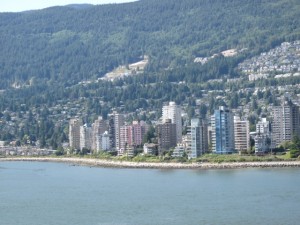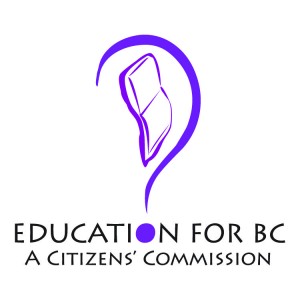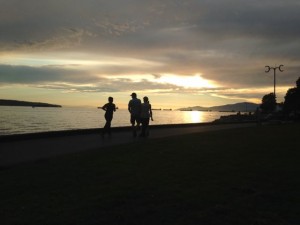Posts Tagged ‘Municipal Election’
With Labour Peace And A Four-Year Horizon
The results may be unofficial, but they are in.
My congratulations to Carolyn Broady, Dave Stevenson, Nicole Brown, Sheelah Donahue, and Pieter Dorsman: the newly elected West Vancouver Board of Education.
With a new mandate of four years and with the campaign behind them, this group of Trustees can now focus on the key priority which is to ensure that our public education system in West Vancouver continues to be one of the best, not only in British Columbia but across Canada.
We are so fortunate in West Vancouver. Not to deny that we too have vulnerable populations and significant needs here, but we are an economically affluent community and one which benefits from the support offered by parents, residents, and businesses. As I’ve often said, it’s not a surprise that we have a graduation rate of 99% in West Vancouver; anything less would be a scandal.
As a school district, we also have an accomplished team of leaders and educators working on behalf of our students and our community — a team recognized for their innovative practices as well as their commitment to excellence. Their efforts are matched by the hard work and diligence of all the district’s employees.
And yet I’m apprehensive.
Because there are pressures on the public education system from which even West Vancouver will not be immune.
The most significant pressure which this Board will face, as with all Boards across the province, is the issue of funding. While West Vancouver has been able to develop other sources of revenue, whether via academies, specialized programs, or international student enrolment, the amount raised may keep annual deficits at bay, but it does not fix the structural deficit upon which our system is based. There are cracks in the foundation.
There’s also a question in my mind as to what the provincial government’s intent may be with regard to both the governance structure and the bargaining structure. I’m worried about consultations which may appear to be based on consensus and which in fact are not.
With the election of a new Board and with one more public Board meeting to attend, I will be entering a new phase. I will now be a former Trustee, but that won’t make me any less committed to the cause of public education, whether in West Vancouver or throughout British Columbia. I will continue to play a part as an interested observer and passionate parent-advocate. To find out more about my plans, please check out EducationForBC.com and the information posted there.
With regard to School District 45, my top three issues for the new Board, in addition to continued advocacy at the provincial level, are: (1) to build and enhance relationships within the district; (2) to ensure the continued prominence of the arts and humanities in all our schools while exploring and expanding new opportunities for students; and, (3) to work towards smaller class sizes as well as enhanced support for students including advanced learners, children with special needs, and English Language Learners.
With a longer mandate and labour contracts in effect until 2019, there’s time and stability within the public education system for this Board to do its very best.
I’m counting on them as are all the members of our community, all our education partner groups, and, most importantly, all our students.
My appreciation to all the candidates who so generously and graciously put their names forward for consideration and my congratulations again to each of the newly elected and re-elected Trustees. Thank you in advance for your diligence, your hard work, and your passionate commitment to public education in West Vancouver.
Make Your Own Choices This November
Here are the speaking notes from my presentation to a gathering of West Vancouver electors this morning about West Vancouver Citizens For Good Government (WVCGG) and the list of Council candidates which they’ve endorsed. These comments are not an exact transcript – they represent the structure, spirit, and intent of my remarks. I’ve made minor edits to the text prior to posting.
- Introduce self.
- What, in your view, is the biggest concern with local municipal elections?
- prompt for low civic engagement and low voter participation
- In 2011, only 23.7% of eligible voters in West Vancouver cast a ballot for councillors.
- With such low turnouts, it is helpful to have individuals and groups who support civic engagement and who try their best to increase voter participation.
- People like this morning’s host. There is one group in West Van in particular which plays a central role in local elections. Do you know which group that is?
- prompt for WVCGG
- When I say West Vancouver Citizens for Good Government, what’s your impression of how many people are involved with the group?
- According to the last census of 2011, West Vancouver has a population of about 43,000 people. According to information about the last election, also 2011, there were 30,754 eligible electors in West Vancouver.
- How many members do you think there are in WVCGG?
- At the October 22 meeting to endorse candidates, the Board of Directors — 16 people — put forward their recommendation and 140 members voted. That’s less than .5% of eligible electors.
- What are the challenges you see with this situation?

- So what is WVCGG?
- founded 1972
- their info says they are a “non-profit, non-partisan, and non-issue community group”.
- interest in ensuring that qualified individuals run for office and to increase voter engagement
- they interview candidates – but don’t post the questions they ask and deliberations are secret
- they hold a public all candidates meeting open to all West Van voters which is great
- and they endorse candidates – but they don’t say why
- once they’ve endorsed candidates, they accept funds from each and with that money conduct extensive advertising which includes a direct mail drop to each residence, something out of the reach of individual candidates — unless they decide to spend some serious money
- You can start to see why this might be a bit of a problem. Here’s the bigger issue.
- At the WVCGG endorsement meeting, the Board of Directors presents its recommendations prior to members voting. In essence what this does is create a situation where the members are voting on the Board of Directors recommended slate and not voting on the individual candidates.
- As former school Trustee Barry Lindahl says — Barry was voted for by the members despite not being put forward as a selection of the Board but that’s rare and proves the exception not the rule — as Barry says, the WVCGG process essentially becomes not about who is best, but who is blessed.
- When I ran in 2011, I was endorsed by WVCGG and I also remember writing a letter in support of them to the North Shore News. But I cannot support the list of endorsed candidates this year although I may support some of the individual candidates on the list because the list of endorsed candidates is very troubling to me.
- Here’s why?
- out of 6 endorsements for council only one is female this is despite the fact that there are more women living in West Van than men. 53% of residents are female and 47% are male according to the 2011 StatsCan figures.
- That’s not representative.
- But let’s say you don’t see that as an issue. Let’s put gender aside. What about incumbency? That’s usually an edge in municipal elections but there were two incumbents who weren’t endorsed.
- Incumbency ought not to be a guarantee, but here’s the thing. The only two incumbents who were not endorsed were the two incumbent female councillors, Mary Ann Booth and Nora Gambioli.
- WVCGG chose to endorse three first-time candidates — with relatively little experience of council — over the two incumbent female candidates.
- That doesn’t sit right with me. Elections ought to be about the best, not the blessed, especially not those blessed by a small group with undue influence no matter how well intentioned.
- I urge you to assess each candidate on your own terms and not someone else’s, when you vote this November.
- Thank You. Questions?
For more information on West Vancouver City Government, click here.
An Announcement in Two Parts – Part 2: Let The Talks Begin
I want to talk to everyone.
I want to talk to parents, students, teachers, administrators, Trustees, business leaders, politicians, school district employees, community residents, the media, and more.
I want to talk to people in the Lower Mainland, throughout British Columbia, across Canada, and internationally. And I want to share the content of these discussions with others.
I want these conversations to be about education. Specifically, I want to discuss and investigate the following three key questions:
- What is education?
- What is the purpose of education?
- How do we deliver this education to all the children of BC to ensure the future health and vibrancy of our society?
I also want to make sure that education is a ballot box issue in 2017. I want the moderator of the next leaders’ debate to pose more than one throwaway question on the topic and I want every MLA candidate in this province to be asked about education when they are campaigning.
Why?

Because the current polarization in the education sector is not productive. The discussions about education in this province have devolved into ideologically formed positions and institutional battles with the result that we are not serving our children well.
The last Royal Commission on Education was held in 1988 and the world has changed since then, but these changes are not reflected enough within our education system.
During the recent job action, the BC Education Plan, a framework for planning proposed under the direction of the Ministry of Education, was politicized and the partisanship compromised the plan as an avenue for wide-ranging conversations.
I appreciate efforts such as BCEdChat on Twitter (Sunday evenings at 7:00 p.m. @bcedchat), the Ministry-led discussions around the curriculum, and many other individual initiatives meant to raise awareness of education issues. I also recognize the hard work of many other groups which have recently emerged to support public education. I hope they’ll all continue with the important work they’re doing. The more voices raised, the more they’re likely to be heard.
I also respect the work of the established groups which represent a collective voice for parents (BC Confederation of Parent Advisory Councils, BCCPAC), educators (BC Teachers’ Federation, BCTF), trustees (BC School Trustees Association, BCSTA), and others. Each organization has their own issues to address and I think they all have much to do in the future to meet the needs of their members.
Even so, it seems to me that we need to draw on a much wider circle of participation.
And that’s what I plan to do.
I want to create a forum and an arena where everyone can contribute to the discussion without having to be a member of any particular organization or having to espouse a particular outlook or perspective.
I want this to be a dialogue for all of us because the way in which we manage education affects each of us.
With this in mind, I’ve established a citizen’s commission on education. It’s a small step. One I felt I had to take because the “bigger picture” discussion about education has been lost in the turbulence of the sector over the past few decades.
This idea may work. It may not work. But I felt I had to do something to galvanize public attention and to give education in this province the attention and support it requires.
It’s time to focus the dialogue on education: what we mean by that term and what we want it to be. Then we need to let our political representatives know what it is we want from our education system. We can no longer sit back and have them tell us what education should look like because based on the evidence, their views do not seem to extend beyond the next election.
Join me in the conversation. Help me create a framework for dialogue. Visit www.EducationForBC.com and follow @edu4bc on Twitter. Help me get the talking started.
Let’s work together. Let’s make this happen for our children and for all of us.
An Announcement in Two Parts – Part 1: Not This Time
Three years ago, I put my name forward as a candidate in the 2011 municipal elections. I ran for the position of Trustee on the West Vancouver Board of Education and was honoured when voters in this community elected me to serve in that capacity.
My foray into electioneering also marked my social media debut outside the comfort zone of Facebook.
I dove into Twitter, a platform with which I’ve become very comfortable and which is now a part of how I absorb, consume, and contribute to media on a daily basis. It has also allowed me to create an invaluable network of connections.
After a long time of saying, “I would like to start a blog,” the election also spurred me to start one which I called The Comfort of Why. The best explanation for this title can be found in the speech I made at the first all-candidates’ meeting in 2011 where I said:
I take great comfort in the question why. As long as I’m asking why, I’m thinking, I’m reflecting, I’m challenging. I am looking for answers rather than assuming I have all the answers. I’m seeking information rather than dictating the way that things ought to be perceived.
To me, this questioning is not about undermining a system and disregarding the work that’s been done. It’s about validating what you believe, being responsive and strategic — making changes when they’re needed, when they’re necessary, and making them at the right time.
My first blog entry was posted on October 19, 2011, and it was comprised almost entirely of questions including this one:
Consider, too, that the BC Ministry of Education is pushing the concept of “personalized learning in the 21st century”. Why? What does it mean?
My position at the time, in regard to this particular question, was as follows:
Well, I want to be at the table to make sure that if there’s an overhaul of the system it’s done well and it’s done right. That it’s implemented in a way which benefits all students.
After three years of being at the table, I still feel this is a valid question and one that is not being addressed at a provincial level.
I still want to have this conversation. In fact, I feel we must have this conversation if we are to continue to offer our children the best opportunities to learn, to grow, and to find their way in the world.
While I recognize the valuable work that our Board has done in the past three years, in collaboration with the District Leadership Team, our education partners, our educators, and all our employees, I will not be seeking reelection in 2014.
Why?
There are a number of factors, but let me focus on three key points.
First, West Vancouver is a community with such depth of talent and with many actively engaged residents who are passionate about education. The deadline for nominations is tomorrow and already seven candidates have filed their papers which means we will have a dynamic and substantive campaign featuring a diverse range of opinions from individuals who all have much to offer.
Second, the most recent job action was very instructive and there are many lessons to be learned in how it played out. One of the most significant learning outcomes for me was to recognize that in order to move the provincial government into action on education, we need much greater direct engagement from the public. That citizens’ voice has to be galvanized if we want to ensure that education is a prominent, if not THE, election issue in 2017.
Finally, education in British Columbia has become such a polarized — and polarizing issue — that what we don’t talk about is education. This discussion — the conversation I’ve always said I wanted to see happen — has been drowned out by criticisms and accusations, by duelling press conferences and media soundbites, by job actions and political posturing.
It’s time that we, as citizens and voters, speak up and get what we want for our children, our society, and our future.
I have some ideas on how we might do just that.
Watch for Part 2.
An Open Letter to the Premier of British Columbia
Dear Christy,
I hope you don’t mind me calling you Christy. We’ve never met, but you seem to pride yourself on connecting personally with British Columbians, so I’m sure you won’t mind my use of your first name.
I think it’s critically important for women to be involved in politics at all levels of government. I ran for the first time in 2011 and was honoured when the residents of West Vancouver elected me to be one of their trustees to the Board of Education.
Given my belief that women in politics are agents for change, it is with some hope that I viewed your election as leader of the BC Liberal Party and, subsequently, as Premier.
The opportunity to have a woman at the helm of the governing party seemed to me to be an opportunity to do things differently, to do things in a manner which is more collaborative and more substantive. To rise above partisanship and to focus on the overall good of our province and not merely to wallow in ideology.
Since then I’ve grown increasingly disillusioned by your approach to politics and governing.
Why?
Because rather than being an innovator in politics, you seem to be perfecting the art of politics by photo opportunity and soundbite rather than by policy and depth.
This is perhaps most evident in your approach to public education in our province and your reaction to the decision by Justice Griffin of the BC Supreme Court.
Essentially, Justice Griffin reaffirmed her earlier finding that legislation in 2002, enacted when you were Minister of Education, was unconstitutional and that the remedies subsequently introduced were insufficient.
This means that hundreds of millions of dollars that should have been invested in the public education system have been diverted. Not only that, but in the intervening twelve years, increases in costs, inflationary increases in conjunction with downloaded costs, have outpaced increases in funding which means that Boards of Education throughout BC have done more and more with less and less.
The continuing success of Boards should not be taken as an indication that funding is adequate. Rather, it is a testament to their resilience, and the resilience of all the partner groups including parents, that our students have continued to thrive and excel.
Imagine the success we would have had if you had maintained funding according to the terms of the 2002 collective agreement!
We would have had greater equity across school districts.
We would have more successfully addressed the needs of our most vulnerable students.
We would have kept more schools open.
To argue now, in light of the court judgement, that the solution is not affordable and that it will cause irreparable harm to students is to focus on being right rather than doing what’s right.
I’m confident that Justice Griffin was not counting on a time machine to carry us back in time and I recognize that filing an appeal is an option available to you in our legal system. I also believe the time has come for you to show leadership and to do things differently.
Negotiate a new contract with the BCTF, with new parameters for September 2014, and agree to provide the additional funding which will be required to fulfill the terms of a new agreement.
That, Christy, would reaffirm my belief in the power you have, as a woman in politics, to make a difference and, in particular, to make a difference which will undoubtedly benefit students in BC’s internationally recognized public education system.


